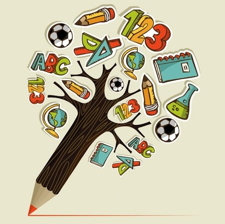Wading Through the Alphabet Soup: An Introduction to Federal Special Education Law
 One of the first things I explain to clients during an initial intake appointment is the basic federal standard for educating students with disabilities. This is frequently referred to as the “alphabet soup” of special education: the IDEA mandates that schools provide FAPE in the LRE according to the child’s IEP. Keeping in mind that talking in acronyms is just job security for attorneys, let’s break it down:
One of the first things I explain to clients during an initial intake appointment is the basic federal standard for educating students with disabilities. This is frequently referred to as the “alphabet soup” of special education: the IDEA mandates that schools provide FAPE in the LRE according to the child’s IEP. Keeping in mind that talking in acronyms is just job security for attorneys, let’s break it down:
IDEA = Individuals with Disabilities Education Act
This is the federal law ensuring that special education services are provided to children with one or more qualifying disabilities, whose disability interferes with their ability to receive an education. The IDEA originated in 1975 under President Ford and has been reauthorized and changed several times, most recently in 2004. While the IDEA is federal law and applies to all public school children in the country, each state also has its own education laws that may be slightly different than the federal requirements; states may provide more protections than those available under federal law, but may not provide fewer or less than the federal standard.
FAPE = Free Appropriate Public Education
The IDEA defines a free appropriate public education as special education and related services that are provided at no cost to parents and are in accordance with the child’s Individualized Education Plan (IEP), among other requirements. 20 U.S.C. 1401(9) (2009). The majority of legal disputes are about the meaning of “appropriate” for a child’s particular circumstances. In 1982, the Supreme Court issued a decision in Board of Education v. Rowley, which provides a working definition of FAPE as “a basic floor of opportunity” providing “some educational benefit.” Bd. of Education v. Rowley, 458 U.S. 176, 200 (1982).
What does “a basic floor of opportunity” mean in real terms? Because children who are eligible for special education have such a wide range of disabilities and needs, it cannot be defined as a specific set of services. However, most children who have passing grades or are making progress towards their IEP goals will be found to have received a basic floor of opportunity.
LRE = Least Restrictive Environment
This is one of the major improvements that the IDEA has made for students with disabilities. No longer does the law allow disabled children to be warehoused or educated exclusively in a special education setting, as long as their IEPs indicate some mainstream time during the school day. The LRE requirement has led to better outcomes, both academically and socially, for disabled students. It can also be a double-edged sword in some instances when parents are seeking a more restrictive environment for their child.
IEP = Individualized Education Plan
All students who are eligible for special education are to receive services in accordance with an IEP, which must be developed to meet the child’s individual needs. Those of you who already have some experience with special education have probably spent many hours at IEP meetings and have a sense of what they entail. We will talk more about IEPs in future columns.
I am excited to be included in this new community of families supporting children with special needs and look forward to sharing more of the legal perspective with you all. In future columns, I will address such topics as the difference between IEPs and 504 plans, discipline issues, assessments, the fair hearing process, private placements and knowing when to seek out legal help, among others.
We are also interested in hearing from you! Feel free to suggest topics for further discussion; just keep in mind that I cannot provide legal advice for your specific situation.
Author Diana B. Glick
Disclaimer:
This column reflects the views of Diana B. Glick in her individual capacity. It does not necessarily represent the views of her law firm or her clients, and is not sponsored or endorsed by them. The purpose of this column is to assist in dissemination of information about federal special education law, but no representation is made about the accuracy of the information. The information contained in this column is provided only as general information for education purposes, and topics may or may not be updated subsequent to their initial posting.
By using this column you understand that this information is not provided in the course of an attorney-client relationship and is not intended to constitute legal advice. This blog site should not be used as a substitute for competent legal advice from a licensed attorney in your state. This column is not intended to be advertising and Diana B. Glick does not seek to represent anyone desiring representation based upon viewing this blog site in a state where this blog site fails to comply with all laws and ethical rules of that state.
Note: To support the site we make money on some products, product categories and services that we talk about on this website through affiliate relationships with the merchants in question. We get a small commission on sales of those products.That in no way affects our opinions of those products and services.

